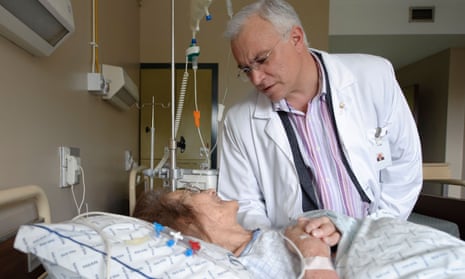Women struggle to get their needs met by doctors because the profession is “overwhelmingly male”, a health minister has suggested.
Jackie Doyle-Price, the minister for mental health, said that in her experience, many women felt “patronised” and “diminished” when trying to access health treatments.
In an interview with the House magazine, she expressed concern that women often felt unable to have a proper conversation with health professionals.
“The doctor is the expert, the patient defers and basically presents themselves saying, ‘fix me’,” she said. “But actually, there needs to be a proper conversation about that.
“There are a lot of issues about the asymmetry in that relationship, but they become particularly acute when you look at women. Quite often, the profession is still overwhelmingly male.”
She added: “There is not a single female MP who hasn’t told me at some point they felt patronised and diminished whilst trying to access health treatments.”
Doyle-Price said that if female MPs, who were “pushy, articulate, good-at-looking-after-ourselves kinds of women”, had problems, then it suggested there was a wider issue.
There are more female than male GPs in England, according to NHS Digital, which put the respective figures at 52% and 48%.
Doyle-Price said this was a positive sign, but that the legacies of a previously “very male-dominated profession” remained.
The ratio is different when it comes to hospital doctors. NHS Digital says that when excluding GPs, women make up 45% of doctors and 36% of consultants.
Doyle-Price said there was a lot of ignorance about fairly common female conditions with the potential for “seismic” impacts, such as endometriosis, fibroids and even the menopause, because women did not like talking about them.
One in 10 women has endometriosis, but it takes an average of seven to eight years to be diagnosed. The charity Endometriosis UK has suggested that women with the disorder were often overlooked by doctors unless they were trying to conceive.
Doyle-Price said the vaginal mesh scandal, in which thousands of women had to have the implants removed because of complications, was “an example of how there isn’t a proper conversation between women and health professionals about the conditions that affect them”.
Women, in particular, needed “much more informed consent” to any procedure or medication they were given, she said.
Doyle-Price said public education was needed to stop women suffering in silence.
“We need to be much more sensitive to the particular needs of women, because the reality is, our bodies are different,” she said. “We have issues that cause more and more morbidities than men would have. That’s just a fact of life.”
The prospects of the proportion of female doctors growing in the future look bright. Numbers have been rising since 2009 and 53% of people training to be doctors are female. But while the entire NHS workforce is 77% female, only 5% of them are doctors, compared with 22% of men.
They also face a gender pay bias at the highest levels. The BBC reported earlier this year that just five of the 100 highest-paid consultants in England were women, with the top-paid man earning nearly £740,000 – two-and-a-half times that of the top woman.
On average, full-time female consultants earned nearly £14,000, or 12%, less a year than males.
A study published last year found that female doctors were more empathetic than male doctors, and that this probably made them better doctors.
